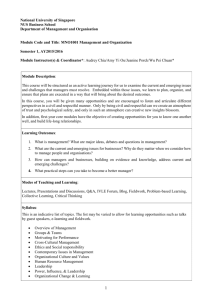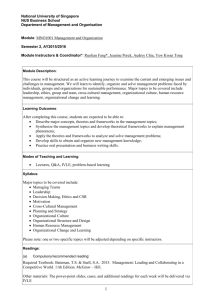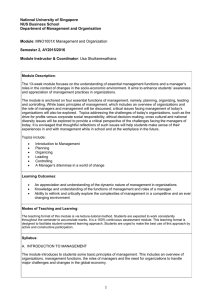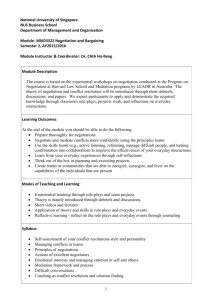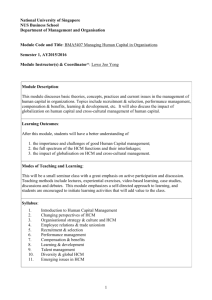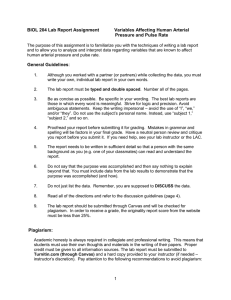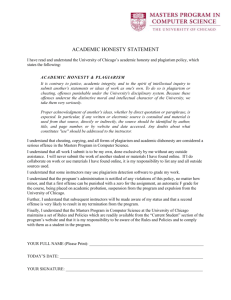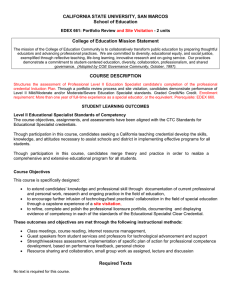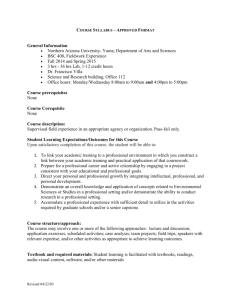MNO3301 Organisational Behaviour
advertisement
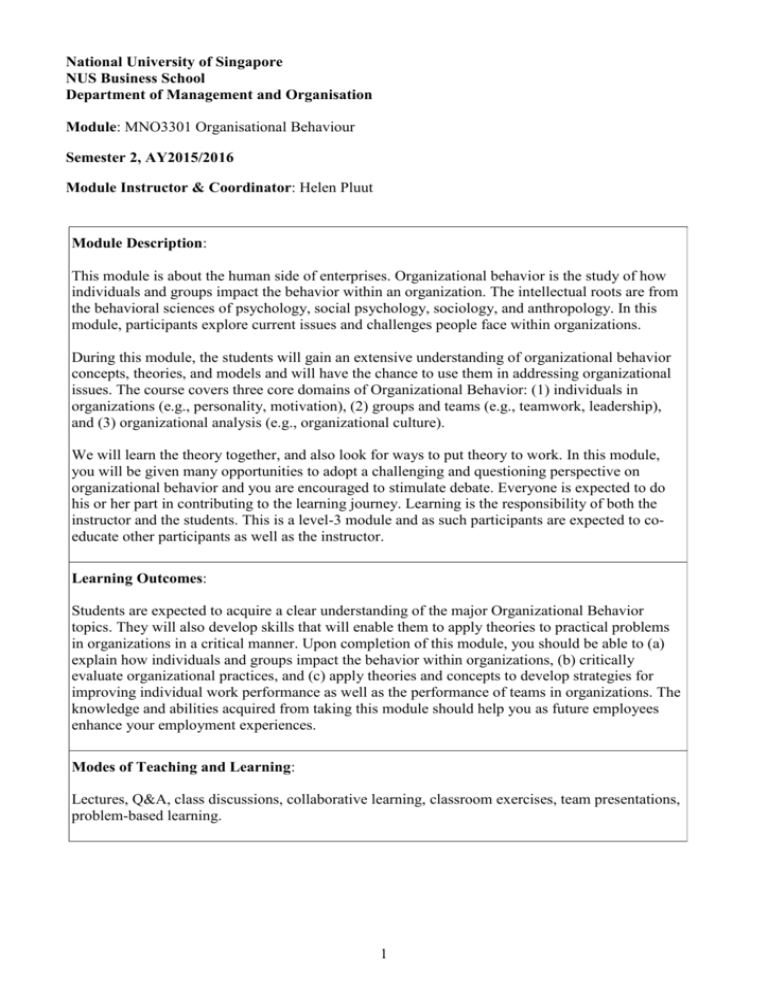
National University of Singapore NUS Business School Department of Management and Organisation Module: MNO3301 Organisational Behaviour Semester 2, AY2015/2016 Module Instructor & Coordinator: Helen Pluut Module Description: This module is about the human side of enterprises. Organizational behavior is the study of how individuals and groups impact the behavior within an organization. The intellectual roots are from the behavioral sciences of psychology, social psychology, sociology, and anthropology. In this module, participants explore current issues and challenges people face within organizations. During this module, the students will gain an extensive understanding of organizational behavior concepts, theories, and models and will have the chance to use them in addressing organizational issues. The course covers three core domains of Organizational Behavior: (1) individuals in organizations (e.g., personality, motivation), (2) groups and teams (e.g., teamwork, leadership), and (3) organizational analysis (e.g., organizational culture). We will learn the theory together, and also look for ways to put theory to work. In this module, you will be given many opportunities to adopt a challenging and questioning perspective on organizational behavior and you are encouraged to stimulate debate. Everyone is expected to do his or her part in contributing to the learning journey. Learning is the responsibility of both the instructor and the students. This is a level-3 module and as such participants are expected to coeducate other participants as well as the instructor. Learning Outcomes: Students are expected to acquire a clear understanding of the major Organizational Behavior topics. They will also develop skills that will enable them to apply theories to practical problems in organizations in a critical manner. Upon completion of this module, you should be able to (a) explain how individuals and groups impact the behavior within organizations, (b) critically evaluate organizational practices, and (c) apply theories and concepts to develop strategies for improving individual work performance as well as the performance of teams in organizations. The knowledge and abilities acquired from taking this module should help you as future employees enhance your employment experiences. Modes of Teaching and Learning: Lectures, Q&A, class discussions, collaborative learning, classroom exercises, team presentations, problem-based learning. 1 Syllabus: Tentative topics to be covered include: Motivation Emotions and moods Stress and well-being Decision-making Diversity Teams Leadership Organizational culture Readings: (a) Compulsory reading: Robbins, S. P., & Judge, T. A. Organizational Behavior (16th edition). Pearson. (b) Supplementary readings: Selected articles as posted on IVLE. Assessment: 100% continuous assessment (CA) Tentative components include: - 4 MCQ tests (40%) Individual class participation (10%) Individual assignment (30%) Group class facilitation session (20%) ACADEMIC HONESTY & PLAGIARISM Academic integrity and honesty is essential for the pursuit and acquisition of knowledge. The University and School expect every student to uphold academic integrity & honesty at all times. Academic dishonesty is any misrepresentation with the intent to deceive, or failure to acknowledge the source, or falsification of information, or inaccuracy of statements, or cheating at examinations/tests, or inappropriate use of resources. Plagiarism is ‘the practice of taking someone else's work or ideas and passing them off as one's own' (The New Oxford Dictionary of English). The University and School will not condone plagiarism. Students should adopt this rule - You have the obligation to make clear to the assessor which is your own work, and which is the work of others. Otherwise, your assessor is entitled to assume that everything being presented for assessment is being presented as entirely your own work. This is a minimum standard. In case of any doubts, you should consult your instructor. Additional guidance is available at: http://www.nus.edu.sg/registrar/adminpolicy/acceptance.html#NUSCodeofStudentConduct Online Module on Plagiarism: http://emodule.nus.edu.sg/ac/ Pre-requisite(s): MNO1001 Management & Organisation 2 3

